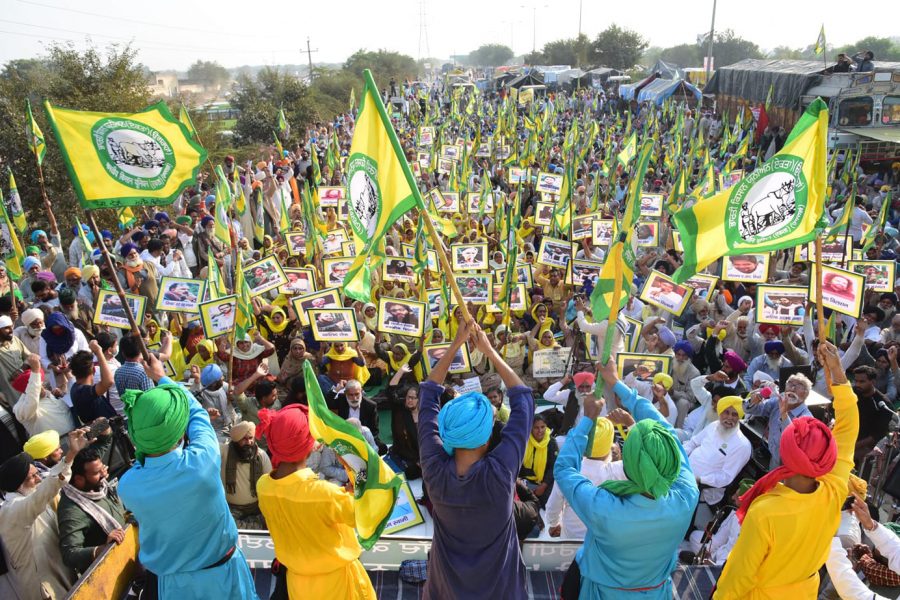Opinion | India integral to Biden’s Asia-centric foreign policy | II
Photo Courtesy of Wikimedia Commons
Farmers in India protest at a rally in 2020. Columnist Eddie Ryan argues that president Biden’s Asia-centric foreign policy needs to focus on integrating India into his plans.
Mar 29, 2021
The prudent humanitarian line on Kashmir, which is incumbent upon the Biden administration to take — one which involves harsher criticisms of human rights abuses in Indian-administered territory, along with greater diplomatic pressure on Prime Minister Narendra Modi to halt them — could easily absorb as a supplementary avenue of pressure at the ongoing Indian farmers’ protests.
Led primarily by farmers from the northern states of Punjab and Haryana, these demonstrations followed from a 200 million-strong general strike of laborers in late November and recently have surpassed 100 days in the capital, New Delhi.
Swathes of India’s impoverished agricultural laborers, numbers being in the hundreds of thousands, have foreclosed several major expressways, including the NH 44, while remaining on the city’s borders in meager tents. Over 248 have died from sickness or suicide, and one protester was murdered by police in one of the tear gas ridden standoffs of these past months.
The resolve of these valiant people — amounting to about half of India’s labor force but only a sixth of its gross domestic product — has been affirmed in dramatic fashion, and they deserve the utmost solidarity in the face of Modi’s jet stream of deregulatory and neoliberal prescriptions.
The legislation in question is three-fold: first, the imposition of a dual-market farming system; second, deregulation of farmer and trader contracts; and third, a removal of price-control storage caps on produce. At present, India’s farmers and traders operate within an admittedly imperfect and inefficient market system — nevertheless, the semblance of government regulation therein keeps farmers afloat.
When time comes to trade, men and women from states like Punjab and Haryana bring their bounty to the “mandis,” where their transactions are fortified by government minimum support prices set to ensure a base-level return on crops. Without fully abolishing the MSPs, Modi’s proposal evolves an adjacent market sphere in which traders can deal with farmers outside the aegis of government.
With freedom of movement between the halves of the dual set-up, farmers will inevitably be impelled to sell their goods at lower costs. In tandem with the elimination of the storage cap and the deregulation of contract negotiations, this slate of reforms invites the all-too-familiar outcomes of neoliberalism: a hand extended to large corporations eager to dictate market prices and deleterious consequences for laborers.
Rendering the whole repressive climate more pungent is India’s recent conduct shown with regards to Twitter. In December, dissident journalist Salil Tripathi had his account suspended after mourning the nearly 1,000 Muslim deaths of the 2002 religious riots in Gujarat along with the Babri Mosque demolition of 1992, perpetrated by a Hindu nationalist mob.
The account suspension drew the ire of prominent writers like Salman Rushdie. Moreover, India has threatened to jail employees of WhatsApp, Twitter and Facebook if data pertaining to the protests is not obediently provided.
The U.S. response thus far has been rather tepid. While the vitality of peaceful protest to a country’s democratic fiber has been duly voiced by the State Department, no real solidarity has been demonstrated; in fact, the U.S. supports the new legislation on the grounds of an interest in the advancement of India’s agricultural sector.
While perhaps a passable position on a matter in which the administration likely wants little involvement, the goal of increased efficiency hardly resonates when the path outlined for its achievement would further debilitate a group already mired in a debt and suicide crisis.
An authentically humanitarian and internationalist foreign policy on this front necessitates a diplomatic confrontation with Modi over his mistreatment of the farming masses, even if the ultimate hope of the U.S. is to see modernization along.
Against the charge that no foul word must be uttered against India because of its vulnerability to China, one must make a geopolitical distinction.
Yes, India needs and merits American support against Chinese bellicosity; and yes, democratic alliances of the kind shared by India and the U.S. traditionally involve strategic silence on certain uncomfortable questions. However, the utterly supine and cynical mindset of Cold War-style “realpolitik” by which despotism and human rights abuses are ignored so long as their perpetrator aligns with “us” against the “true foe” — now China — belongs solely to those with a date at the Hague.
By all means should China be pressured consistently and meaningfully on its genocidal campaign against the Uighurs and for its authoritarian repression in Hong Kong and Taiwan; such measures are of the highest priority and are not mutually exclusive with solidarity for the downtrodden of India and Kashmir. Additionally, one also must not omit the most urgent and demoralizing East-Asian crisis of the moment, Myanmar.
It is thus crucial for the Biden administration — as it aims for a “pivot to Asia” — to make India an integral piece of the program. If the U.S. is to enjoy the long coveted relationship with the world’s other great multi-national, secular democracy, it must hold that nation’s leadership accountable when it shirks its beneficent values and delves into the pits of chauvinism.
Eddie is a sophomore in LAS.
[email protected]






